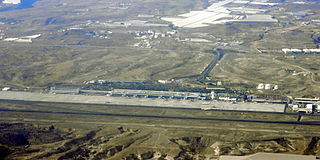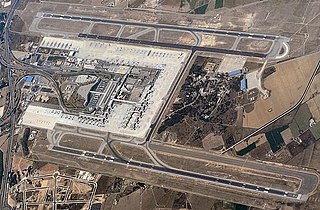
Ceuta is a Spanish autonomous city on the north coast of Africa.

Melilla is one of two autonomous cities of Spain, on the Morocco–Spain border. It has an area of 12.3 km2 (4.7 sq mi). It was part of the Province of Málaga until 14 March 1995, when the Statute of Autonomy of Melilla was passed.

Transport in Spain is characterised by an extensive network of roads, railways, rapid transit, air routes, and ports. Its geographic location makes it an important link between Europe, Africa, and the Americas. Major forms of transit generally radiate from the capital, Madrid, located in the centre of the country, to link with the capitals of the autonomous communities.

Cádiz is a city and port in southwestern Spain. It is the capital of the Province of Cádiz, one of eight that make up the autonomous community of Andalusia.

Adolfo Suárez Madrid–Barajas Airport, commonly known as Madrid–Barajas Airport, is the main international airport serving Madrid in Spain. At 3,050 ha in area, it is the second-largest airport in Europe by physical size behind Paris–Charles de Gaulle Airport. In 2019, 61.8 million passengers travelled through Madrid–Barajas, making it the country's busiest airport as well as Europe's sixth-busiest.

Las Palmas, officially Las Palmas de Gran Canaria, is a city and capital of Gran Canaria, in the Canary Islands, on the Atlantic Ocean.

Málaga is a municipality of Spain, capital of the Province of Málaga, in the autonomous community of Andalusia. With a population of 578,460 in 2020, it is the second-most populous city in Andalusia after Seville and the sixth most populous in Spain. It lies on the Costa del Sol of the Mediterranean, about 100 kilometres east of the Strait of Gibraltar and about 130 km (80.78 mi) north of Africa.

Almería is a city and municipality of Spain, located in Andalusia. It is the capital of the province of the same name. It lies on southeastern Iberia on the Mediterranean Sea. Caliph Abd al-Rahman III founded the city in 955. The city grew wealthy during the Islamic era, becoming a world city throughout the 11th and 12th centuries. It enjoyed an active port that traded silk, oil and raisins.

ENAIRE is the air navigation manager in Spain and Western Sahara, certified for the provision of en route, approach and aerodrome control services. As a public corporate entity attached to the Ministry for Public Works, it is responsible for air traffic control, aeronautical information and the Communication, navigation and surveillance networks necessary so that air companies and their aircraft can fly safely, fluidly and in an orderly manner within Spanish airspace.

Tenerife South Airport, also known as Tenerife South–Reina Sofía Airport, is the larger of the two international airports located on the island of Tenerife and the second busiest in the Canary Islands. It is located in the municipality of Granadilla de Abona and handled over 11 million passengers in 2018. Combined with Tenerife North Airport, the island gathers the highest passenger movement of all the Canary Islands, with 12,248,673 passengers, surpassing Gran Canaria Airport.

Málaga Airport, officially Málaga–Costa del Sol Airport since June 2011, is the fourth busiest airport in Spain after Madrid–Barajas, Barcelona and Palma de Mallorca. It is an important airport for Spanish tourism as it is the main international airport serving the Costa del Sol. It is 8 km (5.0 mi) southwest of Málaga and 5 km (3.1 mi) north of Torremolinos. The airport has flight connections to over 60 countries worldwide, and over 14.4 million passengers passed through it in 2015. In 2017, 18.6 million passengers passed through Málaga Airport.

Santander Airport, officially Seve Ballesteros–Santander Airport, is an international airport near Santander, Spain and the only airport in Cantabria. In 2018 the airport handled 1,103,353 passengers and 11,258 flights, far more than in 1995 when it handled only 180,000 passengers. Since then, the traffic has declined following the trend in Spanish airports and the decrease in operations by some of the companies.

Melilla Airport is an airport located in Melilla, an enclave of Spain in Africa. The airport is located about 4 km (2.5 mi) southwest of the city, near the border with Morocco. Between 1931 and 1967 Melilla was served by the Tauima Aerodrome, even when Morocco had gained its independence in 1956. This Spanish controlled airport did not open until 1969.

Huesca–Pirineos Airport (IATA: HSK, ICAO: LEHC), also known as Huesca Airport, is the airport serving the province of Huesca in Spain.

Burgos Airport (IATA: RGS, ICAO: LEBG), also known as Villafría, is an airport located 4 kilometres (2.5 mi) east of the historic center of Burgos, a city in Spain. The company Aeronova has its maintenance headquarters in Villafría.

Enrique Nieto y Nieto was a Spanish architect known for his Modernisme style, which he continued to receive commissions to design even after it fell out of favor. He was a student of Antoni Gaudí and followed his master's style when he designed noted projects in Barcelona and Melilla. In 1939, he was appointed city architect of Melilla, a Spanish enclave in North Africa. Mellila's collection of modernisme-style buildings constitutes the second largest concentration of representatives of the style outside of Barcelona.

Ceuta Heliport is the heliport, and only air transport facility, serving the Spanish autonomous city of Ceuta, in North Africa.

Palma de Mallorca Airport is an international airport located 8 km (5.0 mi) east of Palma, Mallorca, Spain, adjacent to the village of Can Pastilla. In 2020, the airport handled 6.1 million passengers, making it the third busiest airport in Spain, after Madrid–Barajas and Barcelona-El Prat. The airport is the main base for the Spanish carrier Air Europa and also a focus airport for EasyJet, Jet2.com, Ryanair and Vueling. The airport shares runways with the nearby Son Sant Joan Air Force Base, operated by the Spanish Air Force.

Melilla Airlines was a travel agent based in Melilla, Spain. Its HQ was Melilla Airport. In spite of the company's name, Melilla Airlines lacked a valid Air Operator Certificate. It was not a fully certified airline, but operated as a travel agent that re-sold flights from Aeronova.





















